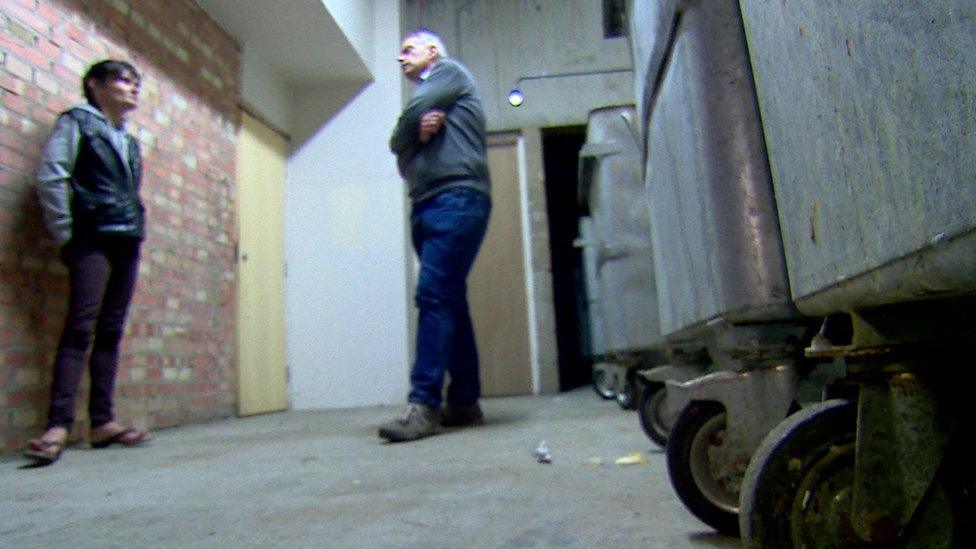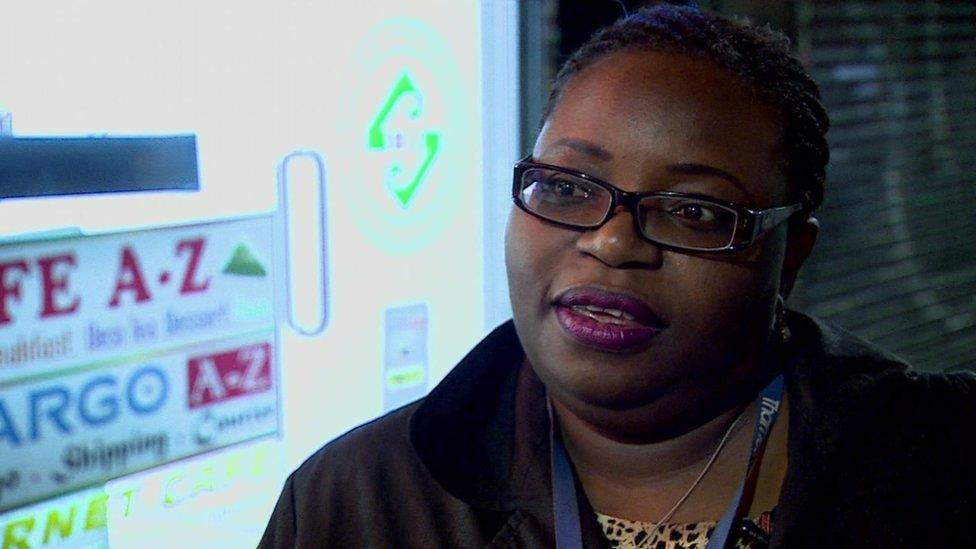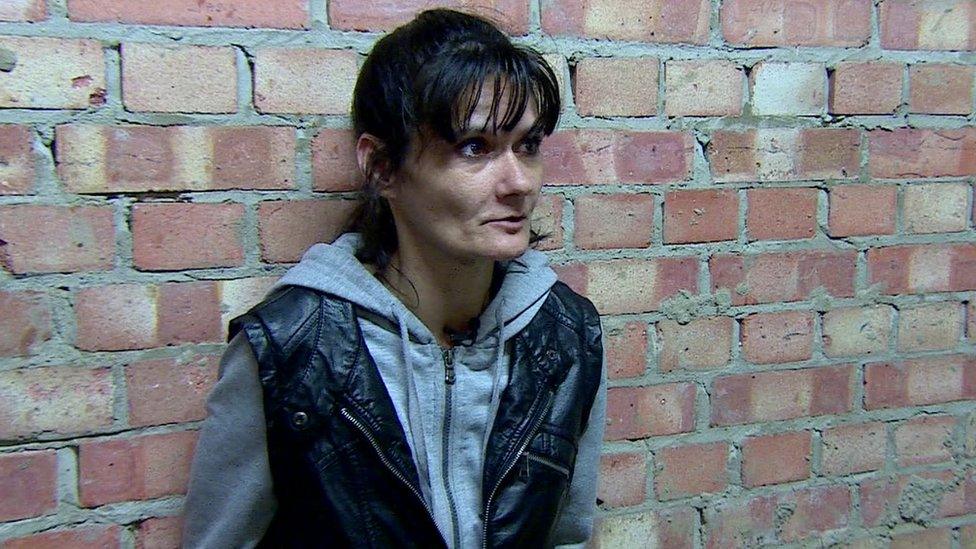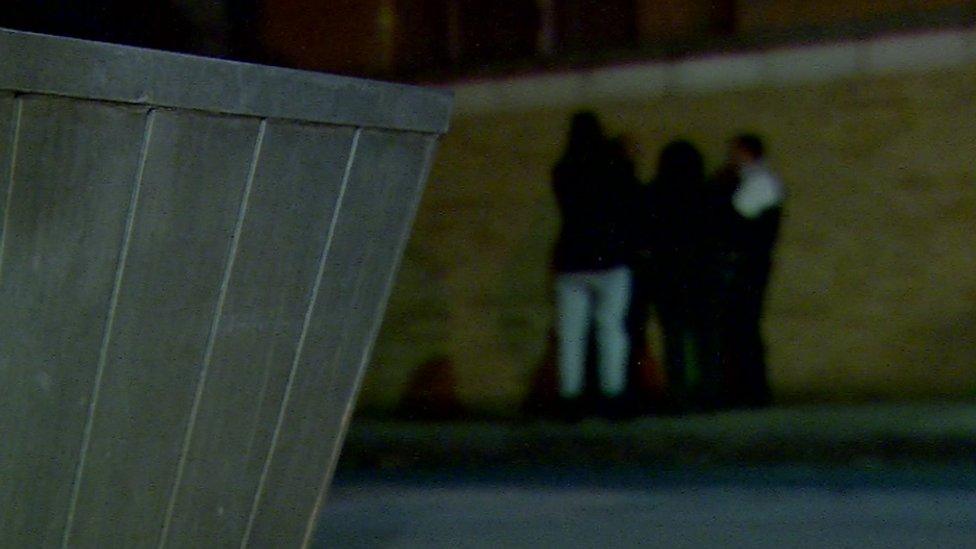Taking mental healthcare to the homeless
- Published

Donna Reader showed Michael Buchanan the bins next to which she used to sleep
The number of rough sleepers with mental health problems has tripled in recent years, and a ground-breaking project in east London now aims to identify and support rough sleepers with such issues.
The BBC's social affairs correspondent, Michael Buchanan, spent three months following Thames Reach staff as they try to help those homeless people who struggle with a range of psychological issues.
We meet in the dead of night in her former home - a bin chute at the bottom of a block of flats.
Donna Reader spent nearly a week amid the large metal containers - sleeping among rotting food and other smells.
"I'm used to it, it doesn't bother me, the smell," says Donna. She'd ended up here after becoming homeless - a chaotic life including long-standing drug addiction and schizophrenia causing her to sleep rough.
Her life was rescued by an outreach team who scour the streets of east London looking for homeless people with mental health problems.
Donna now has a bed in a hostel and attends a clinic every fortnight to receive her psychiatric medication.
"I live healthier now I'm not living on the streets. I wake up - I've got a toilet, I can have a cup of tea, go downstairs, talk to people. My mental health is better, more controlled. You can't make mental health go overnight."

Fatima Taylor conducts outreach work on the streets of east London to help homeless people with mental health issues
The woman administering Donna's injection is Fatima Taylor, a psychiatric nurse.
She works for the homeless charity Thames Reach, part of an outreach team paid for by the local council, Tower Hamlets.
Nightly, they can be found on the streets of east London trying to identify, engage with, and support the increasing numbers of rough sleepers who have mental health problems.
Last year, official data showed there were at least 2,521 people sleeping on the streets of London who had identifiable psychiatric needs. In 2009-10 the figure was just over 700, according to the charity St Mungo's.
We travelled with the team as they went to meet a long-term rough sleeper who'd called for help.
The woman suffers from schizoaffective disorder and wanted her medication.
As Fatima approaches, a man with the homeless woman tries to pull her away. A small argument ensues, there is a scuffle, but Fatima manages to give the woman the pill. Fatima is shaken.
"It's extremely upsetting. It's a vulnerable situation for me as well because he could have turned on me. But then you have to try and do what you need to do to help people like this."

Donna Reader says her mental health improved when she got into a hostel
The team engage in a wide spectrum of outreach work - from initial, gentle contact through to detaining people under the Mental Health Act., external
The rough sleepers are often suspicious and regularly refuse help. Persistence is the key, as we saw with the team's approach to a man who lives in a tent by a busy dual carriageway in the shadow of Canary Wharf.
They visit him up to three times a week. The first time we went along, he wouldn't talk to them.
Weeks later and he did engage - to forcefully tell them he didn't want their help. But the team saw his engagement as a small victory, a sign of progress.
Each evening can be a frustrating battle - but the team rarely lets that deter them.
They spent almost three months trying to talk to one man - CCTV pictures they'd seen suggested his behaviour had become erratic, talking to himself, shouting at strangers.
On the night he finally stopped to talk to them, Fatima concluded that he should be sectioned.
But by now it was after midnight, and no doctors could be found to assess him as required by law. So the man walked off.
"That's the nature of outreach, because it's so unpredictable when you can find somebody so chaotic, to get them into services."

Not everyone the mental health team approach will accept their help
On a separate evening, the team gather in Whitechapel and this time doctors are present. They're here to section a different man, someone with long-term psychiatric needs whose health has deteriorated once more.
He's been displaying erratic behaviour in recent weeks, including begging aggressively. A rough sleeper and habitual drug user, he has been sectioned several times before. He reacts calmly and departs for hospital.
But just two days later he's back on the streets. The psychiatric unit had discharged him - the outreach team say the NHS hadn't bothered to check if he had anywhere to sleep.
"They fall through the cracks all the time," says Fatima. "You try and get them [help] through A&E, [they say] it's a matter of substance misuse, drug induced psychosis, that it's nothing to do with their mental health."
Often however their psychiatric health is the problem - and without the determined effort of this innovative team, far more people would be forced to struggle alone.
- Published30 August 2016

- Published29 August 2016
